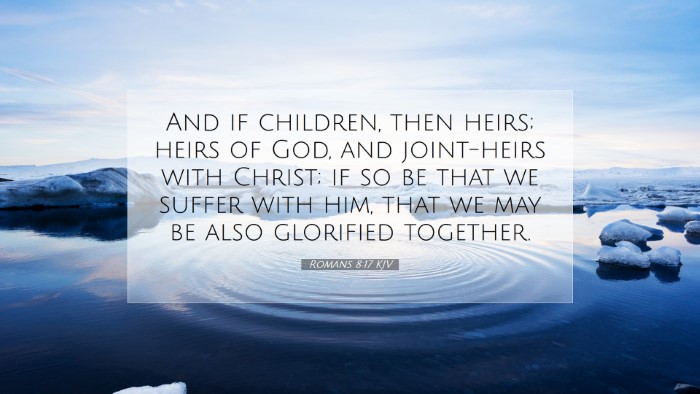Romans 8:17 Commentary
Romans 8:17 states: "And if children, then heirs; heirs of God, and joint-heirs with Christ; if so be that we suffer with him, that we may be also glorified together." This verse encapsulates profound truths about the relationship between believers and their identity in Christ. The insights drawn from public domain commentaries will offer a deeper understanding of this rich text.
Understanding Our Identity as Children of God
Matthew Henry emphasizes that being "children" signifies both privilege and responsibility. It assures us of our status in God’s family. As children, we are not merely servants but are granted access to divine resources, love, and protection. This father-child relationship is essential for understanding the believer's life. Other scriptures affirm this notion, particularly 1 John 3:1, which reflects on the love bestowed upon us as God’s children.
Albert Barnes comments on the concept of "heirs," highlighting that heirs are those who inherit from their parents. In this context, God is the Father, and through our union with Christ, we inherit His promises and glory. This inheritance is not confined to material possessions but encompasses spiritual blessings, eternal life, and communion with God.
The Nature of the Heirship
Adam Clarke delves deeper into the implications of being "joint-heirs with Christ." He notes that this title suggests a shared inheritance in Christ's suffering and glory. The joint-heirship signifies equality in the spiritual estate bestowed upon us, a partnership in the redemptive work and the resulting glory. Clarke elaborates that this shared inheritance reflects the unity and intimacy of our relationship with Christ, intertwining our spiritual journeys with His.
Experiencing Suffering and Glory
The condition "if so be that we suffer with him" warrants a focused discussion. Matthew Henry remarks that the suffering of believers is a shared experience with Christ. He elaborates that while suffering may be daunting, it is an integral part of Christian life, paving the way for the eventual glory that follows. This idea resonates with Paul's teaching throughout his letters, where he consistently connects suffering and glory (e.g., 2 Corinthians 4:17).
Albert Barnes further reinforces that suffering is not a sign of God’s disfavor, but rather it is an expected experience of those who follow Christ. The pattern of Christ's life itself—marked by suffering and sacrifice—provides a model for believers. Barnes reflects on the rejoicing that can come amidst suffering, as it connects us to Christ and His redemptive work.
Glorification: The Ultimate Promise
Adam Clarke emphasizes the assurance that suffering leads to glorification. The use of "glorified together" indicates a transformation that believers will experience at the consummation of their faith. Clarke notes that this promise provides hope and encouragement, reminding believers that the challenges faced in this life are momentary in comparison to the eternal glory that awaits.
Theological Implications
This verse also holds significant theological implications concerning the doctrine of adoption. Matthew Henry articulates that through Christ, believers are adopted into God's family, highlighting the divine plan that encompasses all of creation. This elevation to being heirs is not earned but graciously received, underscoring the enormous love and grace God extends to humanity.
Albert Barnes notes the holistic nature of redemption that encompasses past, present, and future aspects—our current suffering, our present status as heirs, and the future glory that is to be revealed. Such theological insights are critical for understanding the cohesiveness of salvation history as portrayed in Scripture.
Practical Application for Believers
In practical terms, Romans 8:17 serves as a source of strength and hope for Christians facing trials. Matthew Henry encourages believers to view their present sufferings through the lens of their identity as heirs. This perspective fosters resilience and a transformative understanding of pain and adversity within the Christian journey.
Albert Barnes suggests that knowing we are joint-heirs with Christ empowers believers to endure suffering. This shared journey with Christ instills a sense of purpose and belonging. Practically, believers may find comfort in communal worship and fellowship, reinforcing their identity and supporting one another in trials.
Conclusion
Romans 8:17 encapsulates essential truths about our identity as children of God, the nature of our inheritance, and the link between suffering and glory. Insights from Matthew Henry, Albert Barnes, and Adam Clarke resonate with the essence of this verse, providing encouragement and clarity for Christians navigating the complexities of life. Ultimately, this verse calls us into deeper fellowship with Christ, reminding us that our sufferings are temporary, while our inheritance is eternal and glorious.


